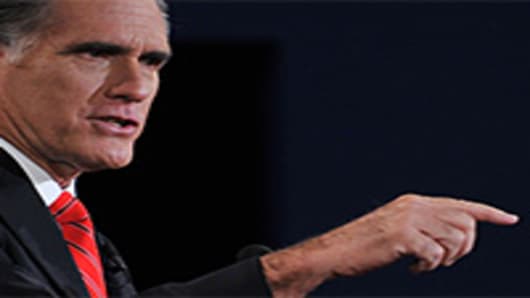Saying that he and his team still felt "troubled" by his loss to President Obama, Mitt Romney attributed his defeat in part to what he called big policy "gifts" that the president had bestowed on loyal Democratic constituencies, including young voters, African-Americans and Hispanics.
In a conference call with fund-raisers and donors to his campaign, Mr. Romney said Wednesday afternoon that the president had followed the "old playbook" of using targeted initiatives to woo specific interest groups — "especially the African-American community, the Hispanic community and young people."
"In each case, they were very generous in what they gave to those groups," Mr. Romney said, contrasting Mr. Obama's strategy to his own of "talking about big issues for the whole country: military strategy, foreign policy, a strong economy, creating jobs and so forth."
Mr. Romney's comments in the 20-minute conference call came after his running mate, Representative Paul D. Ryan of Wisconsin, told WISC-TV in Madison on Monday that their loss was a result of Mr. Obama's strength in "urban areas," an analysis that did not account for Mr. Obama's victories in more rural states like Iowa and New Hampshire or the decrease in the number of votes for the president relative to 2008 in critical urban counties in Ohio.
"With regards to the young people, for instance, a forgiveness of college loan interest was a big gift," Mr. Romney said. "Free contraceptives were very big with young, college-aged women. And then, finally, Obamacare also made a difference for them, because as you know, anybody now 26 years of age and younger was now going to be part of their parents' plan, and that was a big gift to young people. They turned out in large numbers, a larger share in this election even than in 2008."
The president's health care plan, he said, was also a useful tool in mobilizing black and Hispanic voters. Though Mr. Romney won the white vote with 59 percent, according to exit polls, minorities coalesced around the president in overwhelming numbers: 93 percent of blacks and 71 percent of Hispanics.
"You can imagine for somebody making $25,000 or $30,000 or $35,000 a year, being told you're now going to get free health care, particularly if you don't have it, getting free health care worth, what, $10,000 per family, in perpetuity — I mean, this is huge," Mr. Romney said. "Likewise with Hispanic voters, free health care was a big plus. But in addition with regards to Hispanic voters, the amnesty for children of illegals, the so-called Dream Act kids, was a huge plus for that voting group."
Nationwide, Mr. Obama won a slightly smaller share of 18- to 29-year-old voters than he did in 2008, according to exit polls, though he increased his share in battleground states like Florida, Ohio and Virginia. Exit polls showed little appreciable difference between Mr. Obama's performance among black voters nationwide and in many swing states in this election and in 2008. Among Hispanic voters nationwide, Mr. Obama won a greater share in 2012 than in 2008, but perhaps more important, he succeeded in increasing the share of Hispanic voters among the total voting population in key states, including Colorado and Nevada, exit polls showed.
During the call, Mr. Romney was by turns disappointed and pragmatic, expressing his frustration at the outcome on Election Day. A person who was on the call, which included hundreds of participants, let The New York Times listen in.
"I'm very sorry that we didn't win," Mr. Romney said on the call. "I know that you expected to win, we expected to win, we were disappointed with the result, we hadn't anticipated it, and it was very close, but close doesn't count in this business."
He continued: "And so now we're looking and saying, 'O.K., what can we do going forward?' But frankly, we're still so troubled by the past, it's hard to put together our plans for the future."
He added that he was hoping to find a way for the close-knit group, which excelled in fund-raising but was ultimately unable to propel him into the Oval Office, "to stay connected so that we can stay informed and have influence on the direction of the party, and perhaps the selection of a future nominee, which, by the way, will not be me." (He suggested an annual meeting, as well as a monthly newsletter.)
In a news conference of his own Wednesday, Mr. Obama, asked if he still planned to meet with Mr. Romney for a postelection discussion, spoke positively of his former opponent, saying that he "did a terrific job of running the Olympics," and that he appreciated Mr. Romney's ideas on government efficiency.
"I'm not either prejudging what he's interested in doing, nor am I suggesting I've got some specific assignment," the president said, when asked about Mr. Romney. "But what I want to do is to get ideas from him and see if there are some ways that we can potentially work together."


